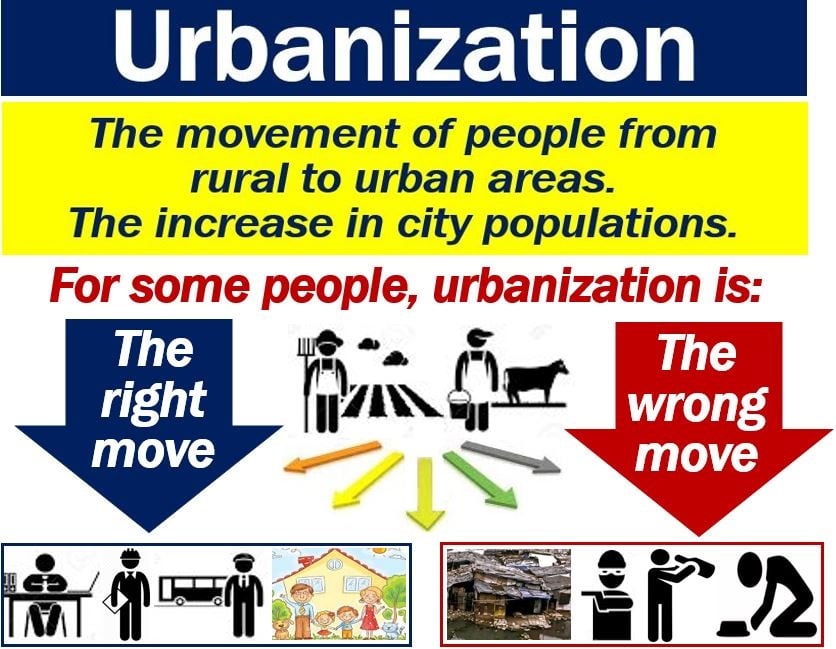Urbanization is the movement of people from the country to towns and cities. The term also refers to the expansion of cities, i.e., growth of urban areas. Urbanization has occurred many times in the past in different civilizations. However, the current migration is occurring on a global scale. Today’s shift from urban areas to cities and towns started in the industrial revolution.
In the world’s advanced economies, more people live in urban than rural areas. In fact, according to the United Nations, more than half of the world’s population today lives in towns and cities.
At the beginning of the twentieth century, just fifteen percent of the world’s population lived in urban areas.
The Cambridge Dictionary has the following definition of the term:
“[Urbanization is] the process by which more and more people leave the countryside to live in cities.”

Urbanization – reasons
People move from the country to the city because they believe they will enjoy a better standard of living.
In most parts of the world, there are more services in urban than rural areas. This is especially so in developing and emerging economies.
Therefore, people migrate to the cities for better jobs, education, healthcare, and other services.
Conserve Energy Future says the following regarding urbanization:
“Majority of people move to cities and towns because they view rural areas as places with hardship and backward/primitive lifestyle.”
“Therefore, as populations move to more developed areas (towns and cities) the immediate outcome is urbanization.”

Most advanced economies subsidize agricultural production. Although this protects their farmers, it results in unfair competition globally.
In other words, agricultural subsidies in the advanced economies undermine farming elsewhere in the world.
Subsequently, farmers and their families in Latin America, Africa, and Asia move from the country to the city. Some of them even migrate to other countries.
Extreme weather events can force people to migrate. Droughts or floods, for example, can trigger a mass exodus of people from the country to the city.
Urbanization – effects
It is fashionable to think that urbanization is bad. Some of it is bad, but some of it is good.
If governments can control urbanization, i.e., it happens within appropriate limits, it can yield many positive effects.
Advantages
- It leads to new employment opportunities.
- Technology and infrastructure make advances.
- Transportation and communication usually improve.
- Educational and medical services are better.
- Overall, the person who migrated enjoys a better standard of living.
- GDP growth tends to go hand-in-hand with urbanization. GDP stands for Gross Domestic Product. The term refers to all the goods and services that a country produces within a set period.
However, these advantages are more likely to occur if the urbanization occurs under the government’s supervision and control.
Disadvantages
- Housing problems: when many people move to urban areas, cities grow. As more people move in, housing gradually becomes scarcer. If the urbanization is chaotic or informal, there can be serious housing shortages.
- Overcrowding: in many cities, especially in developing nations, overcrowding is a serious problem. If too many people migrate to the city over a short period, there is a risk overcrowding.
- Unemployment: urban areas have the highest rate of joblessness in most countries across the world. More than fifty percent of unemployed young people globally live in towns and cities. If rural-urban migration happens too quickly, unemployment is much more likely.
- Slums: if rural-urban migration is on a large scale, existing slums expand, and new ones appear. This is especially the case in expensive cities, i.e., where rents are high.

- Poor sanitation and disease spread: overpopulation, slums, and poor sanitation create an ideal environment for germs to spread. In other words, there is a serious risk of disease. Dirty drinking water and insufficient running water lead to poor health and the spread of diseases. Inadequate sewage facilities also raise the risk of disease. Every country that has experienced rapid urbanization has also reported serious rises in the number of people with asthma.
- Traffic: as cities grow, traffic congestion usually gets worse. If the authorities cannot back up population growth with more roads and public transport, traffic congestion can become unbearable. Traffic congestion does not only slow down everything, but it also leads to high pollution levels. Pollution is bad for human health. In some cities, such as Mexico City, studies have shown that pollution can reduce life expectancy. Life expectancy refers to estimates of people’s lifespans.
- Crime: overpopulation, growing slums, and unemployment go hand-in-hand with rising crime.
Video – What is Urbanization?
This video, from our sister YouTube Channel – Marketing Business Network – explains what “Urbanization” is using easy-to-understand language and examples:
